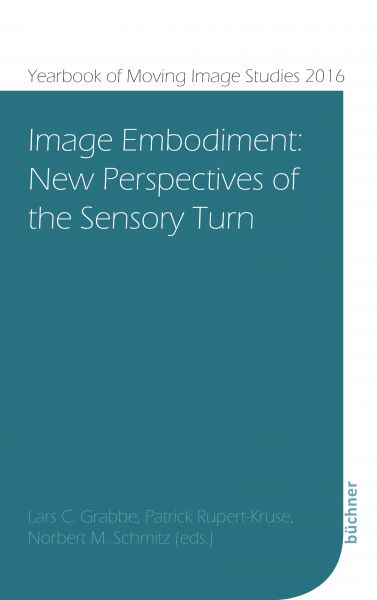Image Embodiment
New Perspectives of the Sensory Turn
In the new media environment, how are bodies and images related? How can, in other words, the human body be integrated with and reformulated in relation to the sensory and perceptual dimension? In response to this question, Image Embodiment looks not just to images and surface appearences but addresses at a deeper level the media that act as the supports for aesthetics. To think about visual culture in the twenty-first century necessarily implies the thinking of the specific role of media technologies. A view to media not only teases out the technical infrastructure of images but brings with it the potential for addressing the different sense modalities and realities of the human body. Recent theories of the sensory turn are effectively highlighting innovative approaches for an autonomous image science and media theory in general. Image Embodiment provides one part of the discourse to synchronize the concepts of image and body, which is then able to connect the perspectives of philosophy of mind, perceptual theory and media as well as image science. This volume monitors and discusses the relation of media and the human body and refers to images, embodiment and the sensory turn within the perspective of an autonomous image science.
Lars Christian Grabbe studierte Philosophie, Soziologie und Neue Deutsche Literaturwissenschaft und Medienwissenschaften an der Christian-Albrechts-Universität zu Kiel (CAU). Im Jahr 2011 promovierte er an der Technischen Universität Chemnitz zum Thema Georg Simmels Objektwelt. Verstehensmodelle zwischen Geschichtsphilosophie und Ästhetik. Seit 2010 ist er Lehrbeauftragter für "Theorie und Geschichte symbolischer Formen" am Instituts für Kunst-, Design- und Medienwissenschaften (IKDM) der Muthesius-Kunsthochschule in Kiel. Im März 2014 wechselte er zudem an den Fachbereich Design der Fachhochschule Münster als Dozent für Medientheorie und Kommunikation. Dort ist er seit Juni 2017 Professor für Theorie der Wahrnehmung, Kommunikation und Medien. Seine Forschungsschwerpunkte liegen im Bereich der Phänosemiose, Medientheorie und -philosophie, Bildwissenschaft, Wahrnehmungstheorie, Kommunikationstheorie, Ästhetik, Filmwissenschaft.
Patrick Rupert-Kruse, Dr. phil, Professor für Medientheorie und Immersionsforschung am Fachbereich Medien, an der Fachhochschule Kiel; 2010 Dissertation zum Thema Imagination und Empathie, lehrte und forschte an der CAU zu Kiel; Leiter des Instituts für immersive Medien (ifim), seit 2015 Vorsitzender der Gesellschaft für interdisziplinäre Bildwissenschaft (GiB), Gründungsmitglied der Forschungsgruppe Bewegtbildwissenschaft Kiel | Münster und verantwortlicher Redakteur des Jahrbuches immersiver Medien, Managing Editor des Yearbook of Moving Image Studies (YoMIS). Seine Forschungs- und Arbeitsschwerpunkte sind: Theorie immersiver Medien, Medientheorie und -philosophie, Medienwirkungsforschung, Bewegtbildwissenschaft.
Norbert M. Schmitz lehrt als Professor für Ästhetik an der Muthesius – Kunsthochschule. Er hat zwischen 1992 und 1996 als Hochschulassistent am Lehrstuhl für Kunstgeschichte der Bergischen Universität-Gesamthochschule Wuppertal gearbeitet. Im Jahr 2000 war er wissenschaftlicher Mitarbeiter am SFB 240 an der Universität-Gesamthochschule Siegen für das Projekt 'Anschluß – Einschluß – Teilnahme'- Formen interaktiver Medienkunst'.
Versandkostenfreie Lieferung! (eBook-Download)
Als Sofort-Download verfügbar
- Artikel-Nr.: SW9783941310780110164
- Artikelnummer SW9783941310780110164
-
Mit
Lars C. Grabbe, Patrick Rupert-Kruse, Norbert M. Schmitz
- Wasserzeichen ja
- Verlag Büchner-Verlag
- Seitenzahl 240
- Veröffentlichung 24.10.2016
- ISBN 9783941310780
- Wasserzeichen ja

